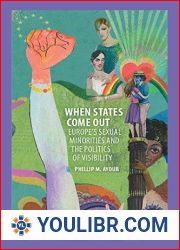
BOOKS - Heresy and the Politics of Community: The Jews of the Fatimid Caliphate

Heresy and the Politics of Community: The Jews of the Fatimid Caliphate
Author: Marina Rustow
Year: June 1, 2008
Format: PDF
File size: PDF 4.4 MB
Language: English

Year: June 1, 2008
Format: PDF
File size: PDF 4.4 MB
Language: English

Heresy and the Politics of Community: The Jews of the Fatimid Caliphate In this groundbreaking book, Marina Rustow challenges our understanding of the origins and nature of heresy itself, offering a bold new perspective on medieval Jewish history that is accessible to both nonspecialists and scholars in the field. Through an in-depth examination of the Cairo Geniza, a repository of papers found in a Rabbanite synagogue, Rustow reveals that despite fierce arguments between the two major Jewish groups - Rabbanites and Qaraites - they depended on each other for political and financial support, cooperating in both public and private life. This evidence of interdependence leads Rustow to conclude that accusations of heresy were sporadic and fluidly shifted across communities, rather than being the result of permanent schisms. The book paints a portrait of a more flexible medieval Eastern Mediterranean world, where power shifted back and forth between the two groups, and demonstrates a new understanding of the historical meanings of charges of heresy against communities of faith.
Ересь и политика общины: евреи Фатимидского халифата В этой новаторской книге Марина Растов бросает вызов нашему пониманию происхождения и природы самой ереси, предлагая смелый новый взгляд на средневековую еврейскую историю, который доступен как неспециалистам, так и ученым в этой области. Благодаря глубокому исследованию Каирской генизы, хранилища бумаг, найденных в раббанитской синагоге, Растов показывает, что, несмотря на ожесточенные споры между двумя основными еврейскими группами - раббанитами и караимами - они зависели друг от друга в политической и финансовой поддержке, сотрудничая как в общественной, так и в частной жизни. Это свидетельство взаимозависимости приводит Растова к выводу, что обвинения в ереси были спорадическими и плавно перемещались между общинами, а не были результатом постоянных расколов. Книга рисует портрет более гибкого средневекового восточно-средиземноморского мира, где власть смещалась туда-сюда между двумя группами, и демонстрирует новое понимание исторических смыслов обвинений в ереси против общин веры.
Hérésie et politique de la communauté : les Juifs du califat fatimide Dans ce livre novateur, Marina Rastov remet en question notre compréhension de l'origine et de la nature de l'hérésie elle-même, en offrant une nouvelle vision audacieuse de l'histoire juive médiévale, accessible à la fois aux non-spécialistes et aux scientifiques dans ce domaine. Grâce à une étude approfondie du Génie du Caire, un entrepôt de papiers trouvés dans une synagogue rabbanite, Rastov montre que, malgré les violentes disputes entre les deux principaux groupes juifs - les rabbanites et les karaïtes - ils dépendaient l'un de l'autre dans le soutien politique et financier, en coopérant dans la vie publique et privée. Cette preuve d'interdépendance conduit Rastov à conclure que les accusations d'hérésie étaient sporadiques et se déplaçaient sans heurts entre les communautés plutôt que du fait de divisions constantes. livre dresse le portrait d'un monde médiéval de la Méditerranée orientale plus souple, où le pouvoir s'est déplacé entre les deux groupes, et montre une nouvelle compréhension du sens historique des accusations d'hérésie contre les communautés de foi.
Herejía y política de la comunidad: los judíos del califato fatimí En este libro pionero, Marina Rastov desafía nuestra comprensión del origen y la naturaleza de la propia herejía, ofreciendo una nueva visión audaz de la historia judía medieval que está disponible tanto para los no especialistas como para los eruditos en este campo. A través de un profundo estudio de la Genisa de Cairo, una bóveda de papeles encontrados en la sinagoga rabbanita, Rastov muestra que, a pesar de las enconadas disputas entre los dos principales grupos judíos - rabanitas y caraítas - dependían unos de otros en apoyo político y financiero, colaborando tanto en la vida pública como en la privada. Esta evidencia de interdependencia lleva a Rastov a concluir que las acusaciones de herejía eran esporádicas y se movían sin problemas entre las comunidades en lugar de ser el resultado de divisiones permanentes. libro dibuja un retrato del mundo mediterráneo oriental medieval más flexible, donde el poder se desplazaba de un lado a otro entre los dos grupos, y demuestra una nueva comprensión de los significados históricos de las acusaciones de herejía contra las comunidades de fe.
Heresia e política comunitária: judeus do Califado de Fatimida Neste livro inovador, Marina Rastov desafia a nossa compreensão da origem e da natureza da própria heresia, oferecendo uma corajosa nova visão da história judaica medieval, disponível tanto para os não especializados quanto para os cientistas da área. Por meio de uma pesquisa profunda sobre o gênio do Cairo, um depósito de papéis encontrados em uma sinagoga rabbanita, Rastov mostra que, apesar das disputas acentuadas entre os dois principais grupos judeus - os rabbanitas e os karaimis - eles dependiam uns dos outros em apoio político e financeiro, colaborando na vida pública e privada. Esta evidência de interdependência leva Rastov a concluir que as acusações de heresia eram esporádicas e fluidas entre as comunidades, em vez de serem resultado de divisões constantes. O livro traça um retrato do mundo medieval medieval do Mediterrâneo, onde o poder se deslocou entre dois grupos, e mostra uma nova compreensão dos significados históricos das acusações de heresia contra comunidades de fé.
Eresia e politica della comunità: gli ebrei del Califfato di Fatimidi In questo libro innovativo, Marina Rasta sfida la nostra comprensione dell'origine e della natura dell'eresia stessa, offrendo un'audace nuova visione della storia ebraica medievale, accessibile sia ai non specialisti che agli scienziati in questo campo. Grazie a una ricerca approfondita del Genio del Cairo, un magazzino di documenti trovato in una sinagoga rabbanita, i Rastov mostrano che, nonostante le feroci discussioni tra i due principali gruppi ebrei - rabbaniti e karaimi - dipendevano l'uno dall'altro nel sostegno politico e finanziario, collaborando sia nella vita pubblica che nella privacy. Questa testimonianza di interdipendenza porta Rastov a concludere che le accuse di eresia erano sporadiche e si spostavano fluidamente tra le comunità e non erano il risultato di continue divisioni. Il libro traccia il mondo medievale medievale più flessibile del Mediterraneo, dove il potere si è spostato tra due gruppi, e mostra una nuova comprensione dei significati storici delle accuse di eresia contro le comunità di fede.
Ketzerei und Gemeinschaftspolitik: Juden des Kalifats von Fatimiden Marina Rastow stellt in diesem bahnbrechenden Buch unser Verständnis von Ursprung und Natur der Ketzerei selbst in Frage und bietet eine kühne neue Perspektive auf die mittelalterliche jüdische Geschichte, die sowohl Laien als auch Wissenschaftlern auf diesem Gebiet zugänglich ist. Durch eine eingehende Untersuchung des Kairoer Genizes, eines Aufbewahrungsortes von Papieren, die in der Rabbaniten-Synagoge gefunden wurden, zeigt Rastow, dass sie trotz heftiger Streitigkeiten zwischen den beiden wichtigsten jüdischen Gruppen - den Rabbaniten und den Karaim - in politischer und finanzieller Unterstützung voneinander abhängig waren und sowohl im öffentlichen als auch im privaten ben zusammenarbeiteten. Dieser Beweis der Interdependenz führt Rastov zu dem Schluss, dass die Vorwürfe der Häresie sporadisch waren und sich reibungslos zwischen den Gemeinden bewegten, anstatt das Ergebnis anhaltender Spaltungen zu sein. Das Buch zeichnet das Porträt einer flexibleren mittelalterlichen östlichen Mittelmeerwelt, in der sich die Macht zwischen den beiden Gruppen hin und her bewegte, und zeigt ein neues Verständnis der historischen Bedeutungen von Ketzervorwürfen gegen Glaubensgemeinschaften.
כפירה ופוליטיקה קהילתית: יהודי הח 'ליפות הפאטימית בספר פורץ דרך זה, מרינה רסטוב מאתגרת את הבנתנו לגבי מוצאה וטבעה של הכפירה עצמה, ומציעה נקודת מבט חדשה ונועזת על ההיסטוריה היהודית של ימי הביניים הנגישה הן להדיוטות והן ללומדות בתחום. באמצעות מחקר מעמיק של הגניזה בקהיר, מאגר של מסמכים שנתגלו בבית-כנסת רבני, מגלה רסטוב כי למרות סכסוכים מרים בין שתי הקבוצות היהודיות העיקריות - הרבנות והקראים - הן תלויות זו בזו לתמיכה פוליטית וכספית, תוך שיתוף-פעולה הן בחיים הציבוריים והן בחיים הפרטיים. ראיה זו של תלות הדדית מובילה את רסטוב למסקנה שהאשמות בכפירה היו ספורדיות ונעו בצורה חלקה בין קהילות, ולא כתוצאה של סכסוכים קבועים. הספר מצייר דיוקן של עולם מזרח תיכוני גמיש יותר, שבו הכוח נע הלוך ושוב בין שתי הקבוצות, ומראה הבנה חדשה של המשמעויות ההיסטוריות של האשמות של כפירה נגד קהילות של אמונה.''
Sapkınlık ve Topluluk Politikaları: Fatımi Halifeliği Yahudileri Bu çığır açan kitapta Marina Rastov, sapkınlığın kendisinin kökeni ve doğası hakkındaki anlayışımıza meydan okuyor ve ortaçağ Yahudi tarihi hakkında hem meslekten olmayan hem de alandaki bilim adamları için erişilebilir cesur yeni bir bakış açısı sunuyor. Rastov, Rabanit sinagogunda bulunan belgelerin bir deposu olan Kahire Genizası'nı derinlemesine inceleyerek, iki ana Yahudi grubu - Rabbanitler ve Karaitler arasındaki sert tartışmalara rağmen, hem kamu hem de özel hayatta işbirliği yaparak siyasi ve mali destek için birbirlerine bağımlı olduklarını ortaya koyuyor. Bu karşılıklı bağımlılık kanıtı, Rastov'u sapkınlık suçlamalarının düzensiz olduğu ve sürekli bölünmelerin sonucu olmaktan ziyade topluluklar arasında sorunsuz bir şekilde hareket ettiği sonucuna varmasına yol açıyor. Kitap, iktidarın iki grup arasında gidip geldiği daha esnek bir ortaçağ doğu Akdeniz dünyasının portresini çiziyor ve inanç topluluklarına karşı sapkınlık suçlamalarının tarihsel anlamlarına dair yeni bir anlayış sergiliyor.
البدعة والسياسة المجتمعية: يهود الخلافة الفاطمية في هذا الكتاب الرائد، تتحدى مارينا راستوف فهمنا لأصل وطبيعة البدعة نفسها، وتقدم منظورًا جديدًا جريئًا للتاريخ اليهودي في العصور الوسطى يمكن الوصول إليه لكل من العاديين والعلماء في هذا المجال. من خلال دراسة متعمقة لمستودع القاهرة جنيزة، وهو مستودع للأوراق الموجود في كنيس الربانيين، يكشف راستوف أنه على الرغم من الخلافات المريرة بين المجموعتين اليهوديتين الرئيسيتين - الربانيين والقرايين - فقد اعتمدا على بعضهما البعض في الدعم السياسي والمالي، التعاون في الحياة العامة والخاصة. هذا الدليل على الترابط يدفع راستوف إلى استنتاج أن الاتهامات بالهرطقة كانت متفرقة وتتحرك بسلاسة بين المجتمعات، وليس نتيجة للانقسامات المستمرة. يرسم الكتاب صورة لعالم شرق البحر الأبيض المتوسط أكثر مرونة في العصور الوسطى، حيث انتقلت القوة ذهابًا وإيابًا بين المجموعتين، ويظهر فهمًا جديدًا للمعاني التاريخية لاتهامات الهرطقة ضد مجتمعات الإيمان.
이단과 공동체 정치: 파티마 칼리프의 유대인. 이 획기적인 책에서 마리나 라스 토프는 이단 자체의 기원과 본질에 대한 우리의 이해에 도전하여 중세 유대인 역사에 대한 대담한 새로운 시각을 제공합니다. 현장. Rabbanite 회당에서 발견 된 논문 저장소 인 Cairo Geniza에 대한 심층적 인 연구를 통해 Rastov는 두 주요 유대인 그룹 인 Rabbanites와 Karaites 사이의 격렬한 분쟁에도 불구하고 정치적, 재정적 지원을 위해 서로에게 의존했다고 밝혔다. 공공 및 사생활동. 이러한 상호 의존성의 증거는 Rastov가 이단에 대한 비난이 산발적이며 끊임없는 분열의 결과가 아니라 지역 사회 사이에서 매끄럽게 움직였다는 결론을 내립니다. 이 책은보다 유연한 중세 동부 지중해 세계의 초상화를 그리며, 두 그룹 사이에서 권력이 앞뒤로 이동했으며, 신앙 공동체에 대한 이단의 비난의 역사적 의미에 대한 새로운 이해를 보여줍니다.
異端與社區政治:法蒂米德哈裏發的猶太人在這本開創性的書中,瑪麗娜·拉斯托夫(Marina Rastov)挑戰了我們對異端本身的起源和性質的理解,為該領域的非專業人士和學者提供了大膽的新觀點。。通過對Rabbanite猶太教堂中發現的論文庫開羅Geniza的深入研究,Rastov表明,盡管兩個主要的猶太團體(Rabbanites和Karaite)之間發生了激烈的爭執,但他們仍然依靠彼此的政治和財政支持,在公共和私人生活中進行合作。這種相互依存的證據使拉斯托夫得出結論,異端指控是零星的,並且在社區之間平穩地移動,不是持續分裂的結果。這本書描繪了一個更加靈活的中世紀東地中海世界的肖像,那裏的權力在兩個群體之間來回轉移,並展示了對異端指控對信仰社區的歷史意義的新見解。








 49
49  3 TON
3 TON








































